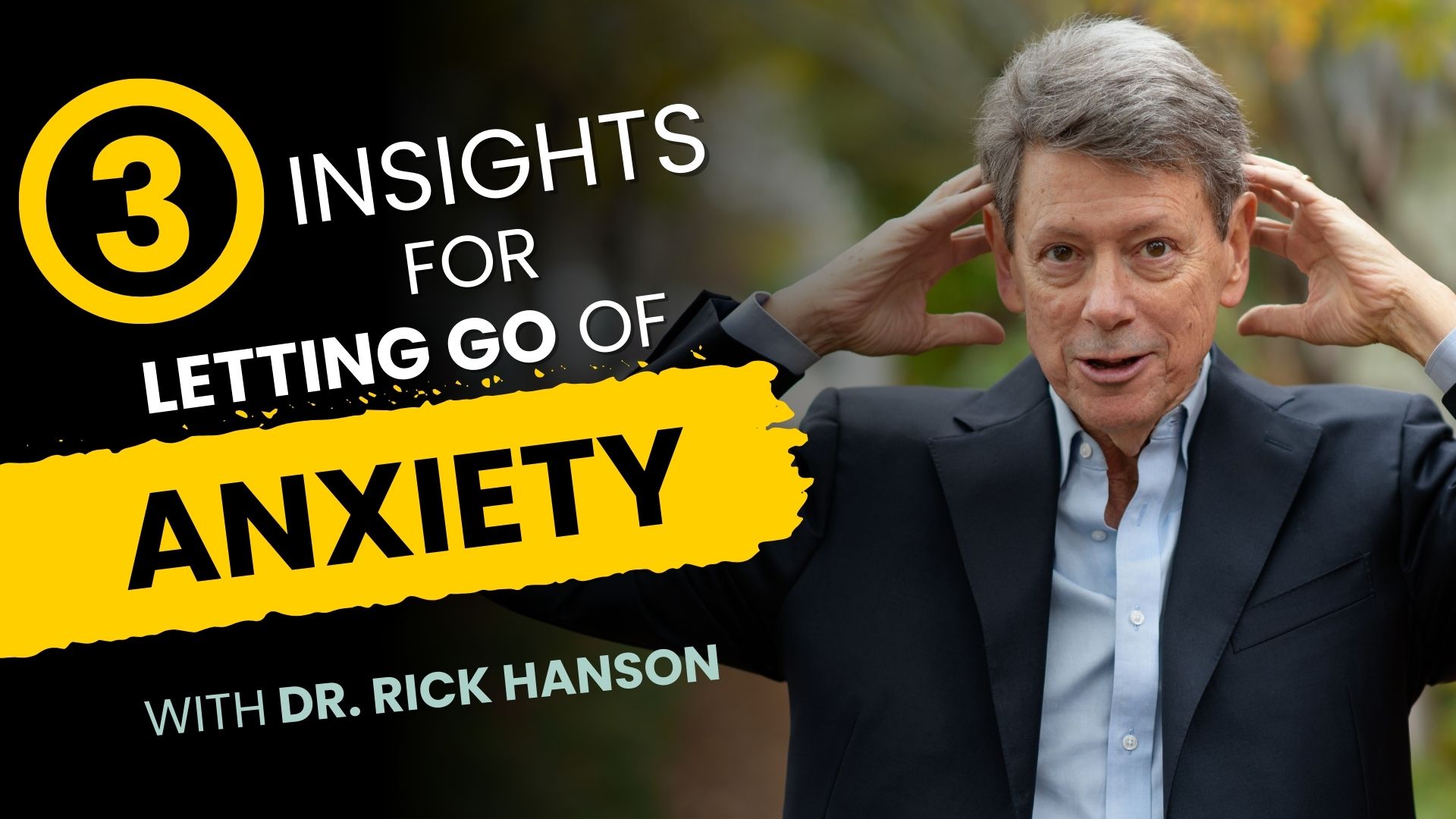From the Blog
Writings on Well-Being Dr. Rick Hanson

Talk + Meditation: Releasing Anxiety with Three Kinds of Insights
Find out why anxiety shows up and three small insights that can help you relax, feel safer inside, and handle life with more ease.
Get these articles delivered directly to your inbox every week.
"*" indicates required fields
Meditation + Talk: Making Peace in Your Mind with Other People
In this Wednesday Night Meditation, Dr. Rick Hanson offers a guided meditation and talk on Making Peace in Your Mind with Other People, both inside yourself and in reality altogether, which includes a Q&A and discussion.
Meditation + Talk: Taking Refuge In The Good That Endures
In this Wednesday Night Meditation, Dr. Rick Hanson offers a guided meditation and talk on Taking Refuge In The Good That Endures, both inside yourself and in reality altogether, which includes a Q&A and discussion.
Cultivate Goodwill
Ill will creates negative qualities, whereas goodwill creates positive qualities. As a social and loving species on the planet, we have the wonderful ability and inclination to connect with others, be empathic. But we are also aggressive.
Meditation + Talk: Accepting the World
In this Wednesday Night Meditation, Dr. Rick Hanson offers a guided meditation and talk on Accepting the World, which includes a Q&A and discussion.
Meditation + Talk: Accepting Other People
In this Wednesday Night Meditation, Dr. Rick Hanson offers a guided meditation and talk on Accepting Other People, which includes a Q&A and discussion.
Meditation + Talk: Accepting All of Who You Are
In this Wednesday Night Meditation, Dr. Rick Hanson offers a guided meditation and talk on Accepting All of Who You Are, which includes a Q&A and discussion.
Meditation + Talk: Acceptance
In this Wednesday Night Meditation, Dr. Rick Hanson offers a guided meditation and talk on acceptance, which includes a Q&A and discussion.
Meditation + Talk: How to Develop Genuine Equanimity
In this Wednesday Night Meditation, Dr. Rick Hanson offers a guided meditation and talk on How to Develop Genuine Equanimity, which includes a Q&A and discussion.
Transform Ill Will
Goodwill and ill will are about intention: the will is for good or ill. Ill will creates negative, vicious cycles. But that means that good will can create positive cycles. Plus good will cultivates wholesome qualities in you.
Meditation + Talk: Brain Tips for Deep Calm
In this Wednesday Night Meditation, Dr. Rick Hanson offers a guided meditation and talk on Brain Tips for Deep Calm, which includes a Q&A and discussion.
Meditation + Talk: Calming Reactions to Others
In this Wednesday Night Meditation, Dr. Rick Hanson offers a guided meditation and talk on Calming Reactions to Others, which includes a Q&A and discussion.
Meditation + Talk: Working with Anger in Relationships
In this Wednesday Night Meditation, Dr. Rick Hanson offers a guided meditation and talk on Working with Anger in Relationships, which includes a Q&A and discussion.
Meditation + Talk: How to Use Anger and Not Let It Use You
In this Wednesday Night Meditation, Dr. Rick Hanson offers a guided meditation and talk on How to Use Anger and Not Let It Use You, which includes a Q&A and discussion.
Accept It
Acceptance is the foundation of wisdom and inner peace. It is easy to accept life’s beautiful things. It is the hard things in life that are hard to accept. The sweet spot is both by accepting the fact that they are what they are.
Meditation + Talk: Finding Peace and Presence in Daily Life
In this Wednesday Night Meditation, Dr. Rick Hanson offers a guided meditation and talk on Finding Peace and Presence in Daily Life, which includes a Q&A and discussion.
Meditation + Talk: 5 Ways to Steady the Mind
In this Wednesday Night Meditation, Dr. Rick Hanson offers a guided meditation and talk on 5 Ways to Steady the Mind, which includes a Q&A and discussion.
Meditation + Talk: The Inner Peace That Releases Fear
In this Wednesday Night Meditation, Dr. Rick Hanson offers a guided meditation and talk on The Inner Peace That Releases Fear, which includes a Q&A and discussion.
Meditation + Talk: Letting Go While Aiming High
In this Wednesday Night Meditation, Dr. Rick Hanson offers a guided meditation and talk on The Freedom from Suffering in the Buddha’s Central Insight, which includes a Q&A and discussion.
Meditation + Talk: The Freedom from Suffering in the Buddha’s Central Insight
In this Wednesday Night Meditation, Dr. Rick Hanson offers a guided meditation and talk on The Freedom from Suffering in the Buddha’s Central Insight, which includes a Q&A and discussion.
Meditation + Talk: Your Life’s Journey – and Lessons from the Buddha’s Own Journey
In this Wednesday Night Meditation, Dr. Rick Hanson offers a guided meditation and talk on Your Life’s Journey – and Lessons from the Buddha’s Own Journey, which includes a Q&A and discussion.
Meditation + Talk: Finding Refuge in Positive Qualities We Internalize from Others
In this Wednesday Night Meditation, Dr. Rick Hanson offers a guided meditation and talk on Finding Refuge in Positive Qualities We Internalize from Others, which includes a Q&A and discussion.




















